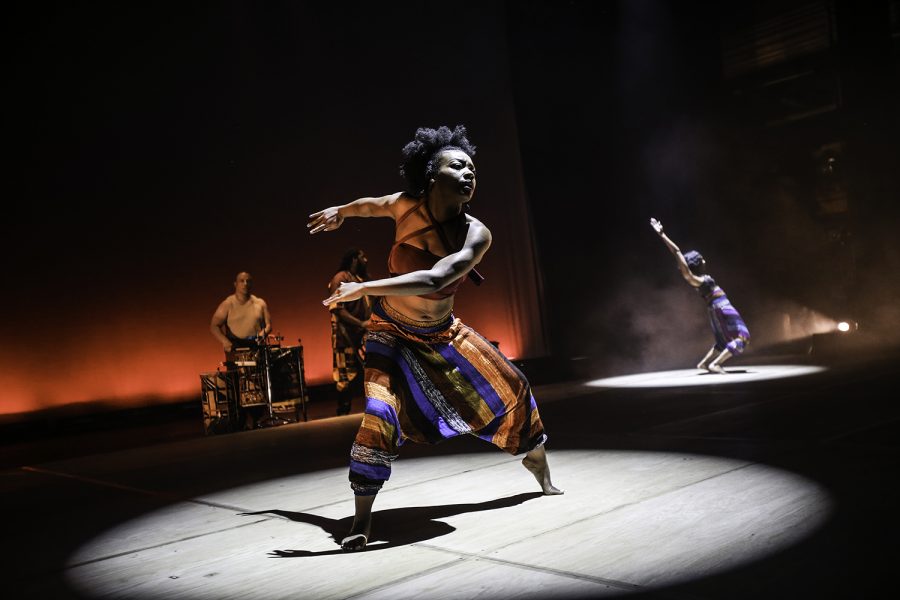Step Afrika! dance troupe to perform at Hancher
Step Afrika! will perform “Drumfolk” at Hancher after a week of community involvement with UI Students and other groups.
September 9, 2021
In 1739, 20 enslaved Africans in the American colony of South Carolina used their drums to initiate a revolt against their slaveholders. This drive for freedom, known as the Stono Rebellion, caused widespread apprehension within the American British Colonies and was met with the Negro Act of 1740. This act greatly restricted the expression of enslaved Africans and banned their use of the drum.
This Saturday at Hancher, Step Afrika! will retell the story of the Stono Rebellion and the Negro Act of 1740 through a theater experience called Drumfolk. For Jakari Sherman, Director of Drumfolk and percussionist for Step Afrika!, the show is a story of reclamation.
The dance troupe performs stepping, a percussive form of dance that began to develop after enslaved Africans could no longer use drums to communicate. The dance style is practiced by historically Black fraternities and sororities.
“We have an opportunity to showcase the history of stepping — which is our favorite tradition to perform — but through that story, we’re able to see the use of the drums a lot in the show and the introduction of a lot of early African American percussive traditions,” Sherman said.
Some of these traditions include the hambone, the ring shout, and more recent contemporary stepping, Sherman said.
“I really love the journey that we take through that history and all the different forms that you see along that path,” he said.
Because Drumfolk explores a very specific facet of American history, Step Afrika! Founder and Executive Director C. Brian Williams recommended that viewers read about both the Stono Rebellion of 1739 and the Negro Act of 1740 before the show.
“This really fascinating piece of legislation, drafted by American colonists — from what was then the colony of South Carolina before the country was truly formed — raises the questions about protests and the history of social injustice in the country,” Williams said. “It also raises questions about how we respond to social injustice.”
In the case of the Negro Act of 1740, instead of creating more freedoms for the enslaved Africans, the colonists tried to repress their freedom even more. Freedom is what the enslaved Africans were fighting against in the Stono Rebellion of 1739, and is an ongoing fight today, Williams said.
“Even to this day, you see people fighting against systemic injustice and inequality in the country. But we always see people moving to make it better,” Williams said. “Drumfolk is our effort to tell the story from early American history that predates the country’s existence. It’s a great moment in history that more Americans should know more about.”
Step Afrika! has been in Iowa since Monday, and the company has been busy practicing, performing, and educating all week. Last night, the company helped dedicate a sculpture at the Muscatine Art Center to Mary Jo Stanley, who was a great friend of the arts, Hancher Executive Director Chuck Swanson said.
RELATED: A bright new semester: Hancher kicks off UI school year with an outdoor light show
On Wednesday, Step Afrika! performers spent most of their day with UI dance students, teaching master classes on stepping.
Step Afrika! will perform Drumfolk live at Hancher on Saturday evening. According to Swanson, the performance is a historical moment that addresses the past and brings up social issues today.
After the show, there will be a “talk-back” for people to discuss what they’ve seen on stage with Williams and some of the Step Afrika! dancers. In Swanson’s eyes, there is no better way to begin the fall season at Hancher.
“It’s a pretty amazing way to kick off our season,” Swanson said. “It’s a week of exactly the work that Hancher strives to do.”
Tickets for Drumfolk can be purchased through the Hancher box office, and the show will begin at 7:30 p.m. on Saturday, Sept. 11.














